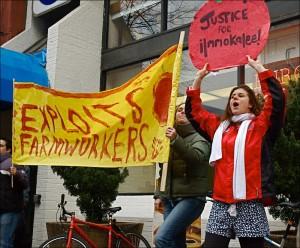Friday’s ice and rain did not put a freeze on a Georgetown Solidarity Committee protest at a Burger King restaurant in the 1600 block of K Street. Cheers of “Down, down with exploitation! Up, up with fair food nation!” and fliers awaited Burger King customers that day as they ventured to the restaurant for their lunch breaks.
GSC has been working with the Coalition of Immokalee Workers “organizing for better wages, [improved] working conditions and an end to modern-day slavery,” said Ashwini Jaisingh (COL ’08), one of the protestors.
A town in southern Florida, Immokalee is home to more than 4,000 farm workers, most of whom pick tomatoes. They are paid about 45 cents for every 32-pound bucket they fill, according to the CIW’s Web site.
“Workers make an average of $10,000 per year,” Jaisingh said. This income falls places them and their families below the poverty line, which the U.S. Department of Health and Human Services currently places at $21,200 for a family of four.
In April 2007, McDonald’s agreed to increase the price it pays pickers to 46 cents per bucket, and in May, Yum Brands, which owns chains including Taco Bell, Long John Silver’s, KFC and Pizza Hut, followed suit.
Julia Shindel (COL ’10), a GSC member, said the group’s goal is to appeal to Burger King through their consumers.
“We want to spread awareness. We want people to know what’s going on,” she said. “Burger King can basically do whatever they want,” Shindel said. “But they have one power that controls them – consumers.”
Organizers said anti-Burger King protests are currently taking place nationwide. At each one they present the manager with a letter which calls for managers to contact Burger King Corporate Headquarters and asks them to stop the “human rights crisis” in Immokalee.
“The main objective is letting the manager know, and he’ll let his supervisor know that there’s significant consumer pressure,” said Kelsey Spitz (SFS ’10).
The group Friday, however, forgot a copy of the petition.
“I’m not really expecting anything as a direct result of this protest,” GSC member Joe Parker (SFS ’10) said, “but hopefully the larger effort will get Burger King to give in.”
While protestors succeeded in irritating management, their message never made it beyond the 1600 block of K St. “They came and did what they did – it was hard on business,” said Raj Raj, the manager, “but I didn’t tell anyone else about it.”
GSC members said they chose this location because “at lunchtime, this Burger King is extremely packed,” Shindel said.
While many passers-by ignored the protestors, a few stopped to talk to students and took flyers, while one man even joined in. “I’m for another penny, I’m for another dollar!” onlooker Richie Jones shouted, “Those workers deserve to get paid!”
Jaisingh said she became involved with the CIW after she attended an alternative spring break trip to the town in 2005. When she returned to Georgetown, she and other members of the GSC began working more closely with the coalition. From Feb. 6-7, GSC members attended the United Students Against Sweatshops Conference and visited Immokalee, where some members said they were “shocked” by what they saw.
“A guy basically kept people chained up in a U-Haul truck,” Jaisingh said. “The only compensation they received was alcohol and drugs, to increase their dependency. . We talk about sweatshops abroad, but seeing sweatshops right here in the United States is a very sobering experience.”
The protest marked the end of GSC’s Student-Worker Solidarity Week, which aimed to raise awareness of workers on campus and around the world, Parker said. Events included a screening of a documentary on living wages, a panel of on-campus workers and a round table discussion with a representative of the Coalition of Immokalee Workers.
Jaisingh said GSC’s efforts to improve workers’ rights are not yet finished.
“We’re trying to do a bigger D.C.-wide thing later on,” Jaisingh said.
Burger King declined to comment for this story.
Correction: The article “Students Rally Against Burger King” (THE HOYA, Feb. 26, 2008, A1) erroneously reported that last April, McDonald’s agreed to increase the wages for tomato pickers in Immokalee, Fla., by one cent per bucket; the wage increase was actually one cent per pound.
“








